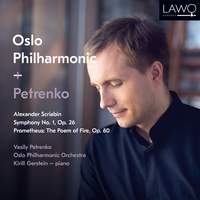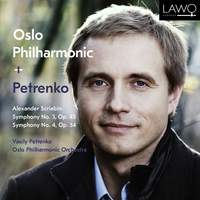Recording of the Week,
Scriabin's First and Fifth Symphonies from Vasily Petrenko
Next week sees the release of the closing instalment of Vasily Petrenko’s superb traversal of the complete symphonies of Scriabin with the Oslo Philharmonic on LAWO, and the project certainly goes out with a bang on this recording of the beleaguered Symphony No. 1 (premiered in incomplete form in 1900 under the baton of the composer and publisher Anatoly Lyadov, who refused to countenance the ‘unperformable’ final choral movement) and the esoteric Fifth Symphony ‘The Poem of Fire’ of 1910 (in which the composer deploys a virtuoso solo piano part, wordless choir and ‘clavier á lumières’ or ‘colour organ’ to expand the orchestral palette into near-psychedelic territory).
 The cycle began in 2015 with the Third and Fourth Symphonies, followed by the Second coupled with the Piano Concerto (again with Gerstein as soloist) last year, and this final volume underlines the shrewdness of Petrenko’s decision to start in the middle and work outwards; the mystical blaze of glory at the culmination of the final symphony Prometheus comes across as all the more radical when heard alongside the conventional late Romanticism of the First Symphony, to the extent that I had to check in triplicate that the two works were written just ten years apart!
The cycle began in 2015 with the Third and Fourth Symphonies, followed by the Second coupled with the Piano Concerto (again with Gerstein as soloist) last year, and this final volume underlines the shrewdness of Petrenko’s decision to start in the middle and work outwards; the mystical blaze of glory at the culmination of the final symphony Prometheus comes across as all the more radical when heard alongside the conventional late Romanticism of the First Symphony, to the extent that I had to check in triplicate that the two works were written just ten years apart!
Scriabin was heavily immersed in Wagner whilst working on his First Symphony (he was simultaneously sketching an opera based on the myth of Eros and Psyche and inspired by in large part by Tristan und Isolde, but the project never came to fruition), and it’s fascinating to see how his obsession with the composer plays out in the context of his grounding in Russian orchestral music: there are numerous passages which sound as if a Tchaikovsky symphony or even ballet-score has been seasoned with dashes of Tristan and Parsifal. The lion’s share of the solo work in this piece falls to the woodwind, and the principal clarinettist who so impressed James in the orchestra’s recording of the Second Symphony is the star of the show once again in the Tristanesque stretches of the long third movement in particular.
The much-maligned sixth movement is presented intact here, with sterling contributions from Russian mezzo Alisa Kolosova (whose smoky lower register and glowing top notes put me in mind of a young Olga Borodina) and tenor Alexey Dolgov: I was all primed for anticipations of Mahler’s Das Lied von der Erde here, but what we get instead is a rapturous pseudo-love-duet of operatic proportions which could have escaped from an early draft of Tristan. The Oslo Philharmonic Choir (alas uncredited in the sleeve-notes, as are the two soloists) bring off the final mighty choral peroration with such precision and verve that it’s hard to see what Liadov’s problem was: the ambitious closing fugue (which builds from the sopranos down) holds no terrors for them, and they sing with such conviction that even Scriabin’s slightly toe-curling purple prose about the transcendent nature of art comes across with a certain dignity. (Perhaps it’s a mercy that the text, too, is omitted from the booklet…).
 After the all-guns-blazing climax of the First Symphony, the spare, foreboding opening of Prometheus hits you like a dash of icy water – the brass (who take something of a back seat for most of the woodwind-dominated First) are on acerbic form, whilst Gerstein’s arresting first entry announces in no uncertain terms that the twentieth century is now well underway and Scriabin has jumped in with both feet. (As his recent marvellous Gershwin album testified, the Russian-born pianist studied jazz alongside his classical training, and there’s a certain improvisatory quality to his playing here that also bears witness to his dual background).
After the all-guns-blazing climax of the First Symphony, the spare, foreboding opening of Prometheus hits you like a dash of icy water – the brass (who take something of a back seat for most of the woodwind-dominated First) are on acerbic form, whilst Gerstein’s arresting first entry announces in no uncertain terms that the twentieth century is now well underway and Scriabin has jumped in with both feet. (As his recent marvellous Gershwin album testified, the Russian-born pianist studied jazz alongside his classical training, and there’s a certain improvisatory quality to his playing here that also bears witness to his dual background).
Petrenko brings often astonishing clarity to a score which can easily seem overblown: in an interview with my colleague David about the first instalment of the series he remarked that ‘once you've found all the transparency in this music, it really starts to shine’, and his approach to both works on this recording certainly bears that out. Without ever driving the music too hard, he maintains momentum and direction throughout the entire twenty-minute span of this single-movement work, so that the eleventh-hour entry of the choir (thankfully wordless this time round!) emerges organically rather than feeling like a non sequitur, and the final hair-raising major triad brings this remarkable piece - and equally remarkable cycle - to a fittingly incendiary close.
Addendum: the label have informed us that the omission of the vocal soloists and choir from the back cover and booklet-notes has been corrected for subsequent print-runs.
Kirill Gerstein (piano), Oslo Philharmonic Orchestra, Vasily Petrenko
Available Formats: CD, MP3, FLAC, Hi-Res FLAC
Kirill Gerstein (piano), Oslo Philharmonic Orchestra, Vasily Petrenko
Available Formats: CD, MP3, FLAC, Hi-Res FLAC
Oslo Philharmonic Orchestra, Vasily Petrenko
Available Formats: CD, MP3, FLAC, Hi-Res FLAC





